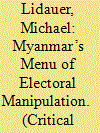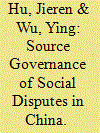|
|
|
Sort Order |
|
|
|
Items / Page
|
|
|
|
|
|
|
| Srl | Item |
| 1 |
ID:
193135


|
|
|
|
|
| Summary/Abstract |
Bangladesh’s ruling Awami League Party has now won three consecutive general elections, an unprecedented achievement in the country’s political history. The 2014 and 2018 elections were, however, mired in controversy. Current analyses of the most recent of these center on the institutional and coercive tactics used by the Awami League to limit the political opposition. International media outlets have focused on allegations of vote rigging and intimidation. This article develops a deeper analysis of the Awami League victory, focusing on two city constituencies, both of which are traditional strongholds of the opposition Bangladesh Nationalist Party. Based on research before and after the 2018 election, it shows that managing party discipline enabled a coherence in the election not achievable by the opposition. The Awami League has, furthermore, successfully built a narrative around development achievements in the country and its vision for the future, both of which have had genuine traction with the public. The 2018 election revealed three pillars of the Awami League’s success: discipline, development, and duress.
|
|
|
|
|
|
|
|
|
|
|
|
|
|
|
|
| 2 |
ID:
193131


|
|
|
|
|
| Summary/Abstract |
In Indonesia, “land mafias” (mafia tanah) proliferate, alongside mafias that cluster around other commodities and state functions. We analyze the composition, character, modes, and sources of resilience of Indonesian land mafias, noting similarities with formations elsewhere, especially India. While taking care to avoid reifying the category, we view land mafias as opportunistic networks, or assemblages, of diverse actors including land brokers, investors, lawyers, gangsters, bureaucrats, law enforcement officers, and politicians. Their goal is to harvest rents from the transfer of ownership and control over land. They feature two elements: first, reliance on coercion (not always physical violence but always entailing transfer of property without freely-given consent, often via fraud or manipulation); second, institutional amorphousness crossing the state-society boundary. We analyze four modes of land mafia operation, though their nebulousness defies easy categorization. In explaining land mafia resilience, we acknowledge Indonesia’s property boom as a driver, but note that the ubiquity of mafias points to a more fundamental explanation: a variety of state formation involving pervasive engagement by state actors in illegal behavior in collusion with wealthy private actors. Mafias are central to Indonesian state formation, rather than aberrations. Feedback loops that incentivize illegal behavior make land mafias difficult to eradicate.
|
|
|
|
|
|
|
|
|
|
|
|
|
|
|
|
| 3 |
ID:
193134


|
|
|
|
|
| Summary/Abstract |
One decade after Myanmar’s military regime organized non-competitive elections that unexpectedly commenced a period of political reforms, the military leadership upended this transitional period with a coup based on a narrative of electoral fraud. Cancelling the November 2020 election results which had confirmed the voters’ preferences for civilian rule, the military has begun organizing fresh elections while concurrently leading a war against the population. Building on Schedler (2002) and the debate on authoritarian elections, this article analyses the military’s contemporary menu of electoral manipulation as a comprehensive set of intertwined strategies. It integrates the analysis of various technical elements of the authoritarian electoral process that are often only looked at in isolation. The article deconstructs the military’s election-related narratives as self-legitimation in a region where authoritarian elections are the norm. Despite considerable efforts to forge conditions in their favor and create an aura of legitimacy, however, Myanmar’s military does not appear very imaginative in this undertaking, but employs a retrograde toolbox in a brutal manner. Whether this strategy is successful will not depend on the authoritarian leaders’ skills alone, but also on recognition from domestic, regional and international audiences which the junta’s performance seeks to achieve.
|
|
|
|
|
|
|
|
|
|
|
|
|
|
|
|
| 4 |
ID:
193136


|
|
|
|
|
| Summary/Abstract |
It is often asserted that the Thai public, particularly members of the urban middle class in Bangkok, are inherently conservative, leading them to support mass protests preceding recent military coups. What is often overlooked is that support for these movements has not been consistent, with polls suggesting that at many points, the Bangkok public has opposed these protests. This prompts the question: why has the broader public supported anti-democratic conservative moments at key moments, but not others? This article argues that Thai conservative movements have received support when they engage in populism, in contrast to when these movements revert to more traditional, authoritarian mobilization tactics. This points to the possible existence of an alternative strand of Thai conservatism, one this article tentatively terms populist conservatism. Paying attention to this vague, yet powerful symbol of “the People” offers a more plausible explanation for the successes and failures of modern Thai conservative movements.
|
|
|
|
|
|
|
|
|
|
|
|
|
|
|
|
| 5 |
ID:
193133


|
|
|
|
|
| Summary/Abstract |
Thailand’s sex industry for same-gender sexual services for men has seen a shift to a predominantly migrant workforce, particularly in northern Thailand. The majority of male sex workers in Chiang Mai are ethnic Shan nationals from neighboring Myanmar. This research explores the lives of Shan migrant male sex workers, their adaptations to and survival strategies in the pre- and post-pandemic periods. The paper employs an intersectionality approach to understand how the intersections of class, gender, ethnicity, legal status, and the larger context of transnational sexual commodification shape the ways Shan migrant men engage in sex work. Based on two sets of data collected before and after the Covid-19 pandemic, the research explores how Shan male sex workers utilize their sexualities and other forms of capital while managing a plethora of risks.
|
|
|
|
|
|
|
|
|
|
|
|
|
|
|
|
| 6 |
ID:
193132


|
|
|
|
|
| Summary/Abstract |
This article examines the features and limits of a new dispute resolution mechanism implemented by Chinese courts called, “Source Governance of Social Disputes” (SGSD). Differing from existing extralegal means of dispute resolution, SGSD aims to bring courts back to the center of dispute resolution by pre-emptively intervening in dispute-prone processes via technology-based mechanisms. However, this has generated two pitfalls. Although preemptive repression can be adopted by deploying digital technologies to impose mediation on people and persuade them to make compromises, such technological deployment by and large fails to resolve the root causes of social disputes. Additionally, SGSD introduces new risks of technological abuse which may coerce litigants to accept mediation instead of adjudication, causing an erosion of public confidence in the Chinese legal system and a weakening of regime legitimacy.
|
|
|
|
|
|
|
|
|
|
|
|
|
|
|
|
|
|
|
|
|